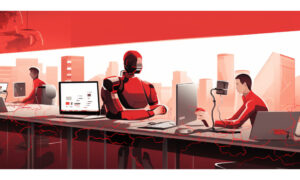How can digital transformation help with workplace transformations?
- 10 Min Read
It’s hard to believe that 20 years ago, we were still getting our heads round email. Today a plethora of technologies, from artificial intelligence to the internet of things, are turning our workplace upside down, enabling us to completely reimagine the way we do business. What will these transformations look like?
- Author: Gareth Platt
- Date published: Sep 18, 2018
- Categories

In HR we’ve been more affected than most. The last wave of technologies, often referred to as SMAC (social, mobile, analytics and cloud) allowed us to automate many key functions and the HR role has changed completely, moving away from record-keeping and towards a holistic planning role, designing strategies to improve our businesses.
 An effective digital transformation process can extend similar benefits to all corners of the company. With 50% of work tasks soon to be computerised, digital technology will free up everyone’s space and time, with the potential to make staff happier and more productive.
An effective digital transformation process can extend similar benefits to all corners of the company. With 50% of work tasks soon to be computerised, digital technology will free up everyone’s space and time, with the potential to make staff happier and more productive.
Yet research shows that over 80% of digital transformations fail, and it’s often because employers think simply installing the new tech is enough. They don’t sit down and think about the end game, or get their staff involved. If companies want to realise digital’s full benefit for genuine workforce transformation, they need to rebuild their business around it.
As Colan Mehaffey, former digital consultant to the Scottish Government, puts it, “we spent the first six-seven years in trasnsformationland writing cheques we couldn’t cash, because we didn’t grasp the organisational challenges required. We talked of frontloading benefits – based on efficiencies which weren’t being developed until much later on.”
This article is designed to help HR managers, and other executives, avoid this pitfall in their own transformation strategy. With analysis from leading authorities on HR and the future of work, it looks at each potential benefit of digital transformation – and explains how companies can harness them to their own unique advantage.
Empowerment
One obvious benefit of digital transformation is its democratising power. With so many brand-new technologies to master, it’s impossible for C-suite executives to hoard intellectual control as they may have done in the past. The days of top-down culture, with bosses pulling all the levers, are over.
This fundamental shift may seem daunting at first. But in fact it’s hugely empowering: staff with digital skills have the opportunity to take greater control, and thus have the incentive to upskill and become evangelists for their technology. It’s the ideal stimulus for workforce transformation based on growth, both personal and collective.
To maximise this benefit, senior decision-makers need to think deeply about what they want their transformed business will look like. They need to accept that the dynamic between staff and senior management will shift, and try to engage staff in the transition, not shut them out.
A great example of this is Pitney Bowes, which holds regular global innovation roundtables and invites teams to share best practice. Another is Cisco, which hosted a HR hackathon for its global workforce of over 71,000 people, and received over 100 key suggestions to improve the employee experience.
Julie Lock, who’s worked in HR for 30 years and now works as an innovation director, says ‘I’ve seen that go horribly wrong because the board decided ‘this is what we want to do because this is the industry is telling us to do it,’ but they didn’t like it when employees became empowered to challenge and question decisions and plans; they shut the programme down.
“People become confident to challenge things, to call things out when they don’t like something, and the board have to be ready for that. Sometimes the feedback isn’t what they’re expecting.
“If you’re not liking the feedback, think about making changes and question the makeup of the exec suite, rather than shutting it down.”
Efficiency and productivity
Perhaps the most frequently trumpeted benefit of the digital revolution is efficiency. We’re told that digital solutions give us the power to work smarter, slashing staff costs while creating a lean, pin-sharp operation.
The tools are certainly available. Instant messaging tool Slack is designed to improve communication across business, while Yammer allows companies to mould bespoke social networks. Project management tools such as Asana and Basecamp facilitate instant collaboration across multiple sites, while Trakstar has earned rave reviews for its 360-degree performance reviews.
In addition to this new tech, we’ve seen a fundamental shift in project management. Many companies have abandoned the old ‘waterfall’ method in favour of the ‘agile’ approach, an iterative paradigm drawn straight from the software development industry which emphasises quick, staged product roll-outs, backed by regular mini-launches and tweaks along the way.
HR has long been in the vanguard of this transformation, using a suite of new technologies to get leaner. Jon Ingham, a future of work specialist and author of The Social Organisation, tells us that “in HR we see technology-based platforms being used a lot more to get people working. Digital platforms let people share their skills and experience. We’re also seeing AI used to find the best people to do the task, and blockchain co-ordinating the process.”
But Julie Lock believes more can be done. She says HR departments need to prioritise the development of customisable workflow engines and “build business process flows which will automatically inform the right person of their obligation to complete a stage in the process. Deliver a real-time view of the workload for an individual and automatically prioritise workloads based on due dates.”
Across the wider company, technology shouldn’t be seen as a panacea. Ingham adds that “it’s important we don’t just get seduced by the technology, looking for the newest, shiniest, sexiest thing,” Although each individual piece of software has the potential to drive massive efficiency gains, he believes the key is putting a clear plan in place before adopting any new piece of kit.
“It’s about responding to the digital revolution,” Ingham says, “not just using digital technology.”
Mobility
Alongside the shift in how we work, the digital revolution is also changing where we work. One of its most noticeable by-products has been the rise of remote and flexible working. In the UK, it is thought that around half the workforce will be fully remote by 2020, as companies embrace co-working spaces and the aforementioned communications tools.
A number of companies have tried to delay this change. In one high-profile case, Facebook offered its workers $10,000 to move closer to the office. But this is surely the wrong approach: by accepting mobile working and getting ahead of the curve, companies can enable their staff and create a high-trust culture. According to the Great Place To Work institute, such organisations are likely to have 50% higher turnover than competitors, and a consistent innovation pipeline. They can also tap into new talent pools, particularly ‘returners’ – women coming back to work after career breaks.
The benefits are also applicable to the public sector, where several local authorities are now adopting remote working. One of them is Wigan Council, whose deputy CEO Alison McKenzie-Folan has won awards for her digital-first strategy.
She tells us: “A lot of work we’ve done is in streamlining to help the team work from anywhere. If you’re a social worker you can do your case management notes wherever you are, in a coffee shop, in a community centre. It’s so much quicker now and staff have found it makes their lives so much easier.”
A number of specialist solutions have been designed to facilitate mobile working, including Fujitsu’s excellent Workplace Anywhere solution. But companies mustn’t think that embracing mobility and remote working is simply a case of installing some nifty new software.
Instead they must deal with a fundamental mentality shift: staff are now less likely to tie themselves to a single company, and more likely to pursue freelance and short-term assignments. The average length of service with the same company has fallen to 2.7 years in the UK, an all-time low, while the number of self-employed people has soared to 4.8 million, 50% up on 2001.
Julie Lock says that “the human experience revolution is probably the biggest thing to ever impact HR”, adding that companies need to make people want to work for them.
“We didn’t see this coming,” Lock says, “we didn’t see the impact of having technology at your disposal 24-7, and get your information from anywhere in the world in an instant, as something that was going to change the way we work. But it has and is continuing to do so. HR is reacting slowly to this.
“How [organisations] can react is to start thinking about what humans need, now, to feel fulfilled. Coming to work and picking up a pay cheque isn’t enough anymore. People want to work for a company that has a social responsibility, work for companies that make a difference.
“Not every organisation does change people’s lives, but the company itself can invest in being socially responsible, supporting employees in doing good, and that can engage employees. The smart companies are already doing it.”
Cultural shift
Indeed many ‘smart companies’ and organisations are already building a better workspace in light of the digital revolution. This means both the way the company’s premises are physically laid out, and how it interacts with its employees.
With so many staff using digital tools remotely, companies can start cutting down their workspace and making it more compact. Alison McKenzie-Folan says Wigan Council has moved completely over to hot desking and undertaken a rigorous review of its estate, enabling bosses to close over 20 premises and save over £1 million a year.
This doesn’t necessarily mean shifting to open plan offices – Jon Ingham points out that some research shows people work less collaboratively in such environments. But the planners should definitely build a bespoke scheme for their office, one which promotes cross-functional working and incorporates plenty of break areas. For example, Julie Lock tells us that in her business they have silent spaces for people to relax, as well as ‘meeting huts’ and communal areas for people to socialise.
Executives should also think about how to dive deeper into their workforce, using the raft of specialist digital tools available in the field ‘of sentiment analysis’ – which can burrow into written text and pick out key trends. Twitter has used one such tool to evaluate the feedback provided in staff surveys. IBM has gone a stage further, building its own in-house application to find trends on its internal messaging system.
If that all sounds a bit Big Brother, it demonstrates the ways companies are using digital technology to gain insights into the people working for them. Such insights could be vital in breaking down regressive silo mentalities – and helping employees through the hugely damaging mental health issues which account for an estimated 70 million lost working days in the UK every year.
No magic bullet
Ultimately, it’s all about making digital transformation work for your own business. Companies which get transformation right are those which think carefully about how their business can be improved, and work from there. Knowledge-sharing platforms such as The Digital Transformation People offer advice to help those who want to consider all angles.
Colan Mehaffey recommends putting key stakeholders through intensive workshop programmes to let them become stakeholders in the process, and secure their buy-in from the start.
“You’ve got to conduct deep business analysis with people impacted by the change,” he says. “When you’re changing business process, it’s very easy to get business analysts to speak at people. If you don’t involve the people who are executing those process, it won’t work.
“Do things with people, not at them. Utilise the people who know the users best, and know the processes best. That’s not to say we do whatever they want – but they have to be consulted.”









